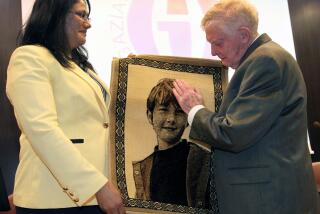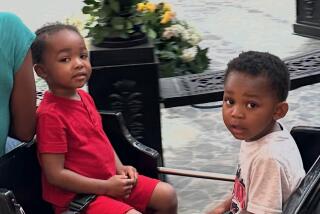Baby Jesse Gets a Heart From Michigan Child
- Share via
LOMA LINDA, Calif. — The strong new heart of a brain-dead Michigan baby was in place and beating steadily in Baby Jesse’s chest late Tuesday night after a transplant operation at Loma Linda Medical Center.
A spokesman for the hospital said that reports from the operating room--where surgeons were still at work on little Jesse Dean Sepulveda--were “very positive.”
“At 9:31 p.m. PDT, the sewing of the donor heart into Baby Jesse was completed and the warming bypass procedure was begun,” Loma Linda vice president for public relations Gus Cheatham said. “This means that warm blood began pumping through the baby from the pump oxygenator to warm the heart. At 9:55, the heart was beating at 140 beats per minute, which is normal for an infant.
“The heart was strong and looked good. Baby Jesse was on bypass for approximately 30 to 40 minutes. This is because, after the suturing is completed, there is a period of careful observation for the purpose of letting the heart’s metabolism stabilize at a normal body temperature. The baby came off bypass at 10:25 p.m. PDT.
“At 10:43 pm., Baby Jesse’s temperature was approaching normal. The heart continues to beat strongly and steadily.”
The operation had begun at 6:25 p.m., less than a dozen hours after the Michigan baby’s parents said a final goodby to their son and authorized donation of his heart to the infant in Southern California.
Baby Jesse had become the focus of public attention last week after Loma Linda officials had declined to consider him for a transplant on the grounds that he might not get adequate postoperative care from his young, unwed parents. The hospital transplant committee reversed itself when the parents agreed to transfer custody of Jesse to his paternal grandparents.
Jesse left Pasadena’s Huntington Memorial Hospital shortly after 11 a.m. Tuesday and was taken in an ambulance to Loma Linda, 60 miles to the east, where a surgical team made ready to perform the four-hour operation.
Baby Jesse was wheeled into the medical center in a special incubator while one of his attendants shielded the baby’s eyes from the bright midday sun with what appeared to be a loose-leaf binder containing his medical records.
Meanwhile, Frank Edward Clemenshaw Jr., born like Jesse on May 25, was flown to Norton Air Force Base for transfer to Loma Linda so that his still-strong heart could be surgically implanted in the chest of Baby Jesse. The Clemenshaw baby arrived at Norton shortly after 2 p.m. on a private jet-ambulance. Although the infant was brain dead, his heart was still beating.
Dr. Leonard Bailey, the Loma Linda infant heart transplant specialist who has performed four successful operations since last November, was standing by with a team of assistants and immediately began to treat Baby Jesse with cyclosporine, a drug that reduces the chances of his body rejecting the transplanted heart.
At that time, he predicted that the operation would take four to six hours and, if all goes well, the baby boy could be released to the custody of his grandparents in as little as 17 or 18 days.
Surgeon Optimistic
Bailey was optimistic about the operation. Laboratory data “suggests it’s feasible for a recipient to live a normal life span,” he said.
Bailey, who brought the Seventh-day Adventist hospital to public prominence in October, 1984, with his implantation of a baboon’s heart in Baby Fae--she died three weeks later--praised the parents of Frank Jr. for agreeing to donate their son’s heart.
“The parents in Michigan have done a really wonderful thing, a terribly compassionate thing,” he said. “As a parent, I can identify with how they must feel.”
A Loma Linda infant transplant committee initially said no to Jesse, who was born with hypoplastic left heart syndrome, a fatal heart defect, on the grounds that his parents were incapable of providing the boy with the post-operative care he would need for survival.
But the Right to Life League of Southern California, an anti-abortion group, and the Pasadena priest who had christened the boy called attention to the child’s plight, telling the press that the medical center denied the boy candidacy for a transplant because his parents were young and unwed.
Reverse Decision
That decision was reversed by Loma Linda officials last week after Baby Jesse’s parents, Jesse Sepulveda Sr., 26, and Deana Binkley, 17, agreed to surrender custody to Jesse Sr.’s parents.
Bailey defended the decisions of the medical center’s transplantation committee at the press conference. The overriding factor, he said, was whether Baby Jesse could get adequate family support for postoperative treatment at home. He denied that either age or marital status of the parents was at issue in the original decision to turn away the baby.
“Neither of those are factors in our selection criteria,” he said. “It’s imperative that the selection committee be convinced that the (postoperative family) support structure is adequate.”
Bailey indicated that the committee was not certain that the parents of Baby Jesse could administer “medicine properly and in the right amounts and . . . be able to keep appointments.”
When the grandparents stepped forward to takeover guardianship, the committee’s doubts were eased, the surgeon said.
Shares Compassion
“No one feels more compassionate towards these babies than I and my associates,” he said. “(But) we reserve the right . . . to determine whether the (family) setting is appropriate for a transplant. This (Baby Jesse’s case) is the first time we’ve had the chance to get new information and make a reassessment.”
Bailey said that of 20 babies with hypoplastic left heart syndrome who have been considered for transplant since the first operation last November, only four have received them. The other 16 died. Some died before suitable donors could be found, others were rejected by the committee on grounds similar to those cited in Baby Jesse’s case. Bailey did not say how many were in each category.
In the last two weeks, two babies have died waiting for donor organs, he said. No one besides Baby Jesse was on the waiting list on Tuesday, he added.
Sepulveda and Binkley heard that a donor was available Tuesday morning while in New York taping a segment of television’s nationally syndicated “Phil Donahue Show” and collapsed in tears. They flew back to Los Angeles to be at Loma Linda for the operation.
Flown to Hospital
“Hang on, we’re coming as fast as we can,” said Jesse Sr. when asked by reporters at Los Angeles International Airport whether he had any words for his son. Sepulveda and Binkley were whisked away in a television news helicopter and ferried to Loma Linda to meet with Bailey prior to surgery.
Also at the medical center were about 18 relatives of the two parents--including Jesse Jr.’s legal guardians, his paternal grandparents, accompanied by their lawyer, Harry Scolinos. The grandparents were unavailble for comment, but Scolinos told reporters that the sudden news of the donor heart reached them Tuesday morning. “It was like having another birth, another chance for life,” he said. “It’s in God’s hands now.”
There were also tears at Butterworth Hospital in Grand Rapids, Mich., where Deborah Walters, and Frank Clemenshaw, of Wyoming, Mich., cuddled and kissed their son one last time and then told reporters of their decision.
Frank Jr., born at 8 pounds, 5 ounces in an emergency Caesarean section, was placed on life-support systems after his birth but was diagnosed as brain dead last week.
His head had pressed the umbilical cord against the mother’s pelvis, shutting off the supply of oxygen to the brain, doctors explained.
‘Hard Thing to Do’
Walters, 33, said she was approached by Michigan doctors to grant permission for the donation after she heard the news of the ordeal of Baby Jesse’s parents.
“I felt for them as a mother who was going to lose her child,” Walters said. “It’s a hard thing to do, to watch a baby die.”
Choking back tears, Walters added, “We feel very good about giving another child a chance. If he (Frank Jr.) has a chance to help another baby live, part of him will live on.”
Weighing 10 pounds, 5 ounces--eight ounces more than he did at birth--Baby Jesse was kept on a respirator at Huntington Memorial Hospital for help in breathing and he has been treated with prostaglandin E-1, an anti-coagulant drug, for about a week.
Keep Blood Flowing
The drug and a surgical procedure performed last week were aimed at keeping blood flowing through the heart and lungs, despite little Jesse’s hypoplastic left heart syndrome.
The condition is an invariably fatal underdevelopment of the heart’s left side and, at Baby Jesse’s birth, doctors at Huntington predicted that he had from a few days to two weeks to live.
But Dr. Paul Johnson, a Huntington cardiologist, said later that the drug and a balloon catheter that was inserted in a heart valve had extended the baby’s life expectancy to several months while the search for a donor heart went on.






